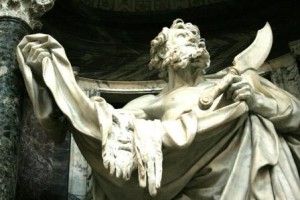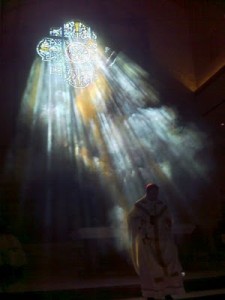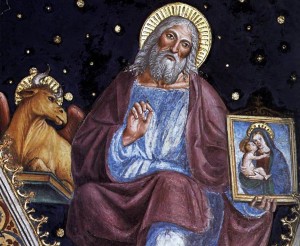Kris Dmytrenko highlighted The New Mass App on today’s edition of “Perspectives” on Salt and Light TV. Here’s the clip – after talking about a different app for the Tridentine Mass, the mention of The New Mass App begins at the 4:05 mark:
Archive for month: August, 2010
 Today is the feast day of St Bartholomew, whom scholars commonly view as being none other than the apostle Nathaniel. Tradition states that following the Ascension, Bartholomew/Nathaniel preached the Gospel in India, and was eventually martyred, being skinned alive. That’s why the saint is portrayed in art as holding his own skin.
Today is the feast day of St Bartholomew, whom scholars commonly view as being none other than the apostle Nathaniel. Tradition states that following the Ascension, Bartholomew/Nathaniel preached the Gospel in India, and was eventually martyred, being skinned alive. That’s why the saint is portrayed in art as holding his own skin.
Here’s John’s account of Nathaniel’s meeting with Jesus:
Philip found Nathanael and told him,
“We have found the one about whom Moses wrote in the law,
and also the prophets, Jesus son of Joseph, from Nazareth.”
But Nathanael said to him,
“Can anything good come from Nazareth?”
Philip said to him, “Come and see.”
Jesus saw Nathanael coming toward him and said of him,
“Here is a true child of Israel.
There is no duplicity in him.”
Nathanael said to him, “How do you know me?”
Jesus answered and said to him,
“Before Philip called you, I saw you under the fig tree.”
Nathanael answered him,
“Rabbi, you are the Son of God; you are the King of Israel.”
Jesus answered and said to him,
“Do you believe
because I told you that I saw you under the fig tree?
You will see greater things than this.”
And he said to him, “Amen, amen, I say to you,
you will see heaven opened and the angels of God
ascending and descending on the Son of Man” (John 1:45-51).
“There is no duplicity in him.” Would that Jesus could say that of all of us.
 The famous “Church Whisperer”, Rocco Palmo, has verified that the United States Conference of Catholic Bishops (USCCB) have finalized their launch date for the new Mass. The new English translation will be effective in America on the first Sunday of Advent, 2011, just over one year from now. That isn’t much time for the massive educational task that lies ahead, as one high-ranking churchman makes clear in the post:
The famous “Church Whisperer”, Rocco Palmo, has verified that the United States Conference of Catholic Bishops (USCCB) have finalized their launch date for the new Mass. The new English translation will be effective in America on the first Sunday of Advent, 2011, just over one year from now. That isn’t much time for the massive educational task that lies ahead, as one high-ranking churchman makes clear in the post:
Msgr. Anthony Sherman, Director of the Secretariat for Divine Worship of the USCCB noted, “A great effort to produce the new Roman Missal for the United States, along with the other necessary resources, has begun. Even as that work is underway a full–scale catechesis about the Liturgy and the new Roman Missal should be taking place in parishes, so that when the time comes, everyone will be ready.”
I hope that The New Mass App can be of service in that task.
 It is fashionable among New Testament scholars to date the composition of the Gospels in this way: Mark circa 70 AD, Matthew sometime later in the 70s, Luke in the 80s, and John approx. 90 AD (with Jesus’ Resurrection circa 33 AD). Even if they were written this late, they are still the equivalent of CNN news flashes in the ancient world. And, of course, a later date of composition does not necessarily equate to a historically inaccurate account. Even at these later dates, eyewitnesses of the life of Christ would still be alive and available to correct erroneous accounts. Having said this, the earlier the Gospels were written, the better the argument for their historicity in the eyes of many. And there is a very good argument that the Gospels were actually written much earlier.
It is fashionable among New Testament scholars to date the composition of the Gospels in this way: Mark circa 70 AD, Matthew sometime later in the 70s, Luke in the 80s, and John approx. 90 AD (with Jesus’ Resurrection circa 33 AD). Even if they were written this late, they are still the equivalent of CNN news flashes in the ancient world. And, of course, a later date of composition does not necessarily equate to a historically inaccurate account. Even at these later dates, eyewitnesses of the life of Christ would still be alive and available to correct erroneous accounts. Having said this, the earlier the Gospels were written, the better the argument for their historicity in the eyes of many. And there is a very good argument that the Gospels were actually written much earlier.
A key to the dating of the Gospels is actually the date of composition of the Acts of the Apostles, because Acts is the second of a two-part work by Luke the evangelist. The Evangelical scholar J.P. Moreland, in his classic apologetic work, Scaling the Secular City, enumerates many arguments for dating Acts between AD 62 and 64, only two of which I’ll mention here. Acts, like every other New Testament book, does not mention the destruction of Jerusalem and its temple in 70 AD (This is, of course, good evidence that all the NT books were completed by this date). It’s hard to believe that Luke’s works in particular, whose Gospel and Acts is so heavily focused on the Holy City, would fail to mention this fact. Second, no mention is made of the fierce persecution of the Church under the crazed emperor Nero, and the resulting martyrdoms of the two central figures in Acts, Peter and Paul, circa AD 64. The martyrdom of James, bishop of Jerusalem in 61 is also omitted. All of this is strange, considering the detail given by Luke to the account of the martyrdom of Stephen the deacon, and that of James, brother of John, another prominent figure in the early Church. Strange, that is, unless Luke wrote Acts prior to 64.
Back to the Gospels: If Luke wrote Acts before 64, that means Luke’s Gospel was written before that. And, since Luke used Matthew and Mark (the first Gospel to be written) as sources, they must be dated even earlier, perhaps as early as the mid-40s to the mid-50s, according to Moreland. Thus, we have biographies of Jesus that are perhaps 12 to 29 years removed from the events of his life – and they are based on sources (e.g. eyewitness accounts and early creeds) even earlier than that.
![]() Q. I’m going to try once more to show that St Paul says that we don’t really need to obey the Ten Commandments. In Galatians he writes, “Brothers and sisters: We know that a person is not justified by works of the law but through faith in Jesus Christ; even we have believed in Christ Jesus that we may be justified by faith in Christ and not by works of the law, because by works of the law no one will be justified” (Gal 2). See! Paul agrees with me! All we need is faith in Jesus Christ! We don’t need “the works of the law”.
Q. I’m going to try once more to show that St Paul says that we don’t really need to obey the Ten Commandments. In Galatians he writes, “Brothers and sisters: We know that a person is not justified by works of the law but through faith in Jesus Christ; even we have believed in Christ Jesus that we may be justified by faith in Christ and not by works of the law, because by works of the law no one will be justified” (Gal 2). See! Paul agrees with me! All we need is faith in Jesus Christ! We don’t need “the works of the law”.
A. Nice try, but it won’t work. When Paul says that we are not justified (made right with God) through “the works of the law”, he’s not talking about the Ten Commandments. He simply can’t be. Why? Consider the words of Jesus himself, in the famous Sermon on the Mount: “Do not think that I have come to abolish the Law or the Prophets; I have not come to abolish them but to fulfill them. I tell you the truth, until heaven and earth disappear, not the smallest letter, not the least stroke of a pen, will by any means disappear from the Law until everything is accomplished. Anyone who breaks one of the least of these commandments and teaches others to do the same will be called least in the kingdom of heaven, but whoever practices and teaches these commands will be called great in the kingdom of heaven” (Matt 5).
Q. I don’t understand. Jesus upholds the commandments, but Paul says we don’t need “the works of the law”. Who’s right?
A. They’re both right, of course! That’s because Paul is not talking about the Ten Commandments at all when he says that we don’t need the “works of the law”. Paul’s talking about something else: the ceremonial works of the Old Covenant. These were hundreds of rules that were tacked on to the Decalogue, which God dispensed with in the New Covenant . The two biggest examples are circumcision and the dietary (kosher) food laws of the Old Covenant. We don’t need to practice these as Gentile believers in order to please God (see Acts 15), but we do have to uphold the Ten Commandments. This is impossible in our own strength, by dint of our own will. As Jesus said, “With man this is impossible, but not with God; all things are possible with God” (Mk 10:27). It is only by the grace of Jesus Christ that we can – and must – keep the Ten Commandments as Catholics.

